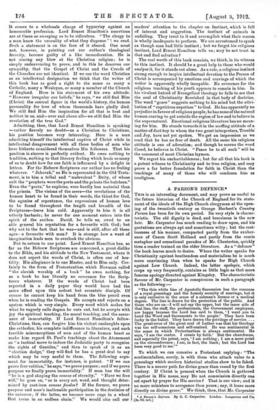A PARSON'S DEFENCE.* Tins is an interesting document, and may
prove as useful to the future historian of the Church of England for its state- ment of the ideals of the High Church clergyman at the open- ing of the twentieth century as George Herbert's Country Parson has been for its own period. Its very style is charac-
teristic. The old dignity is dead, and breeziness is 'the new heir. Mr. Carpenter has much reading to draw upon, and his
quotations are always apt and sometimes witty ; but the rest- lessness of his manner, compacted partly from the exuber- ance of Canon Scott Holland and partly from the comic metaphor and sensational paradox of Mr. Chesterton, quickly tires a reader trained on the older literature. As a " defence" the book leaves much to desire. Where the writer speaks for Christianity against heathendom and materialism he is much more convincing than when he speaks for High Church against Low Church. Indeed, the latter apologia, which crops up very frequently, contains as little logic as that more famous apology directed against Kingsley. The characteristic flavour of Mr. Carpenter is conspicuous in such a paragraph as the following :—
"The thin white line of Apostolic Succession has the romance of a royal genealogy and the homely security of marriage, but it is only exclusive in the sense of a cabman's licence or a medical degree. The line is drawn for the protection of the public. And those who are on—I will not say the upper, but the inner side of that line, the staff, the professionals, the Government employees, are happy because the Lord has said to them, I want you to hand the Word and Sacraments to the people.' They have been lucky in the ballot. They have drawn the privilege of service.... The great error of the great soul of Luther was that his theology was too self-conscious and self-centred. He was sentimental in the sense in which Protestantism is always sentimental. He says, 4 I am the centre. I create by faith.' But the churchman, and especially the priest, says, I am nothing ; I am a mere point on the circumference ; I am, in fact, the limit; but the Lord has been very good to me."
To which we can conceive a Protestant replying : "The sentimentalism, surely, is with them who attach value to a genealogy which modern historical studies show to be faked. There is a nearer path for divine grace than round by the first century. If Christ is present when the Church is gathered together in His name, may He not commission directly one set apart by prayer for His service P That is our view; and it
no more ministers to arrogance than yours ; nay, it leans more directly on divine grace." We think, then, that Mr. Carpenter
• d Parson's Defence. By S. C. Carpenter. London : Longmsna and Co. [9a. ed. net.]
would have written a more useful book if he had thought it less necessary to "let himself go" in depreciation of those who do not altogether take his view of what constitutes a Churchman. It is not uncharacteristic of Mr. Carpenter's school that he salutes Sir Oliver Lodge as Apollos, while be " admits that we cannot compel our deans and canons to believe their own religion."





































 Previous page
Previous page